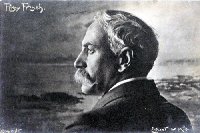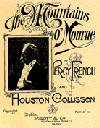 Percy French was born at Cloonyquin, County Roscommon, Ireland in 1854, the second son of Christopher French, L.D., J.P. and his wife Susan Emma. He entered Trinity College, Dublin in 1872 to study civil engineering. Here, instead of focusing on academic matters, he began to develop his remarkable talents for song writing, dramatics, banjo playing and watercolour painting.. He died over eighty years ago but his songs live on, as do recollections of Percy himself.
Percy French was born at Cloonyquin, County Roscommon, Ireland in 1854, the second son of Christopher French, L.D., J.P. and his wife Susan Emma. He entered Trinity College, Dublin in 1872 to study civil engineering. Here, instead of focusing on academic matters, he began to develop his remarkable talents for song writing, dramatics, banjo playing and watercolour painting.. He died over eighty years ago but his songs live on, as do recollections of Percy himself.
After an unusually long number of years French emerged from university with an engineering qualification. He was about to emigrate to Canada in 1883 when he obtained a post on a government drainage scheme in County Cavan. Here, the self-styled 'Inspector Of Drains' also found scope to develop his interest in music and drama whilst a series of spectacular sunsets, caused by the effects of a far distant volcanic eruption, fuelled his enthusiasm for watercolour painting. His time in Cavan also provided inspiration for two of his greatest songs - 'Phil the Fluter's Ball' and 'Slattery's Mounted Fut'.
In Dublin, French was for two years editor of a comic weekly magazine called 'The Jarvey'. He availed of this medium to promote a series of concerts throughout Ireland under the banner of 'The Jarvey Concert Company' and to advertise his ever increasing output of comic songs. Following the demise of 'The Jarvey', French, never far from the footlights, provided the libretto and played the leading role in two comic operas (music by his friend and collaborator, Dr.W.H.Collisson).
In 1891 his young wife, Ettie, died in childbirth just a year after their idyllic marriage and just a few days later their baby daughter died. These tragedies were, apparently, the background for those poignant poems 'Gortnamona', 'Only Goodnight' and 'Not Lost But Gone Before'.
In 1892 Percy married his second wife Helen (Lennie) Sheldon of Burmington House, Warwickshire, England. They had three daughters - Ettie, Mellie and Joan. Joan, the last surviving daughter died in 1996.
At this time French turned to the stage for a fulltime career. Encouraged by a friend and erstwhile partner, Richard C. Orpen, he wrote, produced and played the major part in a topical revue called 'Dublin Up To Date'. Consisting of sketches, caricatures, stories and songs, this show was to form the basis of a stage entertainment that would be his future fame and livelihood.
In 1900 following ever greater acclaim in Ireland and now known professionally as 'Percy French' he went to the richer pastures of London, played successfully in the theatres and music halls of the populous cities of Britain.
The career of Percy French as an entertainer reached its zenith when he and Dr. Collisson toured Canada, U.S.A. and the West Indies in 1910 and received enthusiastic notices in the major cities of the east coast. French also toured the ski resorts of Switzerland from time to time and although based in London from 1900, he returned to play the holiday resorts and towns of Ireland each year without fail. While performing in Glasgow in 1920 he was taken ill and died some days later in Formby, Lancashire.
Today, more than 80 years after his death, Percy French is best remembered as a writer of humorous Irish songs. This activity was, however, merely one of the sidelines of an amazingly varied career that included landscape painting, writing sketches, verse and monologues and the all embracing one of entertaining from the stage and platform - the last named including his lifelong playing of the banjo.
In his early days French usually composed or arranged the music for his songs himself. Many of his songs were inspired by the characters he met and places he saw on his travels around Ireland. He stayed overnight at that warm and friendly shop cum boarding house that gave rise to 'Drumcolliher' whilst the slow pace of life and concern for the individual in the west of Ireland is reflected in 'Are Ye Right There Michael?' - although the local railway of the time had caused French to be late for a performance in Kilkee on an occasion that led to an amusing court case.
 Most of French's later songs were written with music composed or arranged by his friend and erstwhile stage partner Dr.W.Houston Collisson who was a brilliant musician. Songs such as 'Eileen Oge', 'Jim Whelehan's Automobeel', 'Donnegan's Daughter', 'Mrs. Brady' and 'The Mountains o' Mourne' are the fruit of this creative partnership which was also responsible for a highly successful musical comedy 'The Knight of the Road' in 1891. Ernest Hastings composed the music for French's poignant poem 'The Emigrant's Letter' and later still, Philip Green's musical composition fitted to perfection the haunting lines of 'Gortnamona'. French's daughter, the late Ettie, provided the music for 'That's Why We're Burying Him' while more recently still, the famous Irish tenor and performer of Percy French material. Brendan O'Dowda composed the music for French's other moving reminder of the sadness of emigration, 'An Irish Mother'.can be seen Percy French's songs and verse occasionally varied from the comic or humorous towards the sad or poignant and as his life progressed a sometimes wistful note was a distinguishing feature - none more so than his tribute to his jarvey (driver of a horse-drawn cab) of days that had passed - 'Come Back Paddy Reilly, To Ballyjamesduff'.
Most of French's later songs were written with music composed or arranged by his friend and erstwhile stage partner Dr.W.Houston Collisson who was a brilliant musician. Songs such as 'Eileen Oge', 'Jim Whelehan's Automobeel', 'Donnegan's Daughter', 'Mrs. Brady' and 'The Mountains o' Mourne' are the fruit of this creative partnership which was also responsible for a highly successful musical comedy 'The Knight of the Road' in 1891. Ernest Hastings composed the music for French's poignant poem 'The Emigrant's Letter' and later still, Philip Green's musical composition fitted to perfection the haunting lines of 'Gortnamona'. French's daughter, the late Ettie, provided the music for 'That's Why We're Burying Him' while more recently still, the famous Irish tenor and performer of Percy French material. Brendan O'Dowda composed the music for French's other moving reminder of the sadness of emigration, 'An Irish Mother'.can be seen Percy French's songs and verse occasionally varied from the comic or humorous towards the sad or poignant and as his life progressed a sometimes wistful note was a distinguishing feature - none more so than his tribute to his jarvey (driver of a horse-drawn cab) of days that had passed - 'Come Back Paddy Reilly, To Ballyjamesduff'.
In addition to his songs Percy French wrote poems, recitations and verse. Like his songs these usually related to his family, friends or acquaintances as well as his experiences and his moods. He would sometimes parody the more grandiloquent poets and his poem "If I Should Die Tonight" is sometimes taken to parody Rudyard Kipling's famous lines about manhood, entitled 'If'. However, it was an adaptation of a poem "If I Should Die" by Benjamin Franklin King (1857-1894). This is French's version :
"If I should die tonight
And you should come,
And stand beside me,
Lying cold and dumb,
And if while standing there,
You whispered low,
'Here's the ten pounds
You lent me years ago,'
I would arise, although they'd laid me flat,
And say, 'What's that?'
If I should die tonight
But rose to count
With trembling fingers,
That long lost amount
I might live on;
But when
You said' Here's your umbrella
And your fountain pen,'
For one short space
I'd gaze into thy face
And then
Drop dead again."
While a guest in the beautifully situated Glenveagh Castle in the centre of County Donegal, French once penned some lines akin to an epitaph:
"Remember me is all I ask, yet the remembrance prove a task, Forget."
He painted prolifically and often paid for his board and lodgings in such kind. Not known for a desire to accumulate money, he sometimes just gave them to friends or acquaintances. His most sought after scenes depicted the light and character of the Irish landscape in its most evocative moods. This activity, which he perhaps he enjoyed most of all, also provides a colourful record of his tours as an entertainer to Switzerland, Canada, U.S.A. and the West Indies.
The finest all round collection of Percy French's watercolours is nowadays in the care of The Percy French Society at the North Down Heritage Centre in Northern Ireland. Not surprisingly there are views of those mountains at Newcastle, County Down which French made so forever famous with his song 'The Mountains O' Mourne' and included also are scenes from the west of Ireland whose people and landscape he loved best of all.feel for the west of Ireland as it was a century ago is especially evident in his poem 'To The West'
"The Midland Great Western is doing its best,
And the circular ticket is safe in my vest;
But I know that my holiday never begins
Till I'm in Connemara among the Twelve Pins.
The Bank has no fortune of mine to invest
But there's money enough for the ones I love best;
All the gold that I want I shall find on the whins
When I'm in Connemara among the Twelve Pins.
Down by the Lough I shall wander once more'
Where the wavelets lap lap round the stones on the shore:
And the mountainy goats will be wagging their chins
As they pull at the bracken among the Twelve Pins.
And its welcome I'll be, for no longer I'll meet
The hard pallid faces I find in the street;
The girl with blue eyes, and the boy with brown shins,
Will stand for their pictures among the twelve Pins.
Tonight, when all London's with gaslight agleam,
And the Carlton is filled with society's cream',
I'll be 'takin' me tay' down at ould Johnny Flynn's
Safe and away in the heart o' the Pins."
He never made much money - but it was all great fun and to his way of thinking that was what mattered. And people loved him. All sorts of people, of every class and creed. They said it was because his jokes never hurt anyone. He never laughed AT people. He laughed WITH them - which is a very different thing. It is easy to get laughs by poking fun at other people's expense. It takes a clever man - and above all a GOOD man - to make people laugh in the innocent and harmless way that Percy French made them laugh.
Further reading:
The World of Percy French: by Brendan O'Dowda
A Picture of Percy French: by Alan Tongue